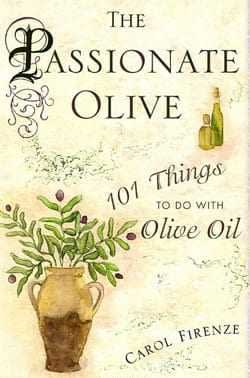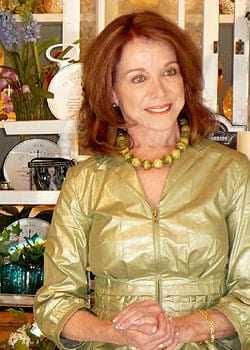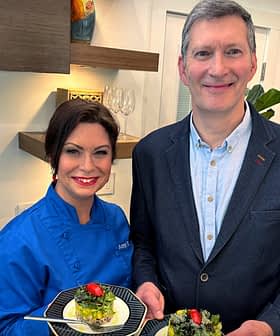By Sophia Markoulakis
Olive Oil Times Contributor | Reporting from San Francisco
Armed with copies of her book and bottles of The Passionate Olive branded extra virgin olive oil and olive oil soap, Carol Firenze is on a mission to educate the public about the holistic benefits of olive oil. With a youthful complexion and gloriously shiny hair, she’s a well-suited spokesperson for nature’s most delicious elixir. Spend a few moments with Firenze and you might be having your daily dose of extra virgin olive oil straight from the bottle. Spend some time reading her book and you’ll be using olive oil to polish your wood floors, lubricate your household hinges, and deter skin infections and digestion ailments.
 Firenze is passionate about olive oil, which is why she continues to remain busy with speaking engagements and book signings five years after The Passionate Olive: 101 Things to do with Olive Oil was first published. Not many other first-time authors of food-related books can make that claim. Nor, can they boast seven printings, including copies in other languages like Turkish and soon Chinese. “While working on the book, my editor assured me that it would ‘grow over time’. And it’s true, it really has,” says Firenze. Every new printing gets an updated reference and retail section as well as revised listings of both California and international producers.
Firenze is passionate about olive oil, which is why she continues to remain busy with speaking engagements and book signings five years after The Passionate Olive: 101 Things to do with Olive Oil was first published. Not many other first-time authors of food-related books can make that claim. Nor, can they boast seven printings, including copies in other languages like Turkish and soon Chinese. “While working on the book, my editor assured me that it would ‘grow over time’. And it’s true, it really has,” says Firenze. Every new printing gets an updated reference and retail section as well as revised listings of both California and international producers.
It seems like Firenze was slightly ahead of the curve when she set out to write a book about the multiple uses of olive oil, even though many of her suggestions and remedies have been around for hundreds of years. Now, with news of olive oil’s potent health benefits reaching the mainstream consumer, Firenze is poised to educate those who will take the time to understand the importance of olive oil in our daily diet. “Since writing the book, the industry has changed with the expansion of interest in extra virgin olive oil. People are becoming more health conscious. People are also becoming aware of the importance of the Mediterranean diet, and at the cornerstone of that is olive oil,” says Firenze.
 As the olive oil industry has changed over the last five years, so has the public’s palate. Firenze acknowledges that years ago when she was involved in a blind focus group, participants actually preferred a low-grade sample over a high-quality extra virgin olive oil. “Now that we have the interest in extra virgin olive oil, the next step in educating the public is to apply this knowledge and practice it by tasting and discussing. Tasting is an important part to understanding the differences in extra virgin olive oils, and an interactive learning experience is crucial to educating the public about olive oil. The tasting experience helps people talk about the product to others,” says Firenze. “Like wine, people’s palates have become sophisticated. People are beginning to understand the nuances of extra virgin olive oil and are learning the differences between cultivars.”
As the olive oil industry has changed over the last five years, so has the public’s palate. Firenze acknowledges that years ago when she was involved in a blind focus group, participants actually preferred a low-grade sample over a high-quality extra virgin olive oil. “Now that we have the interest in extra virgin olive oil, the next step in educating the public is to apply this knowledge and practice it by tasting and discussing. Tasting is an important part to understanding the differences in extra virgin olive oils, and an interactive learning experience is crucial to educating the public about olive oil. The tasting experience helps people talk about the product to others,” says Firenze. “Like wine, people’s palates have become sophisticated. People are beginning to understand the nuances of extra virgin olive oil and are learning the differences between cultivars.”
From a commerce standpoint, the last five years have seen unprecedented growth in emerging markets of the olive oil industry. Firenze is excited about New World oils and believes that any conversation and interest in olive oil is positive, and that rules and regulations are needed as production grows. “Olive oil is the most easily adulterated of the oils. We need to police ourselves in regards to production and quality control,” says Firenze. “It’s a known fact that Italy exports more olive oil than it produces; so to have competition from places like Australia is good.”
Her heart, though, is firmly planted in the Italian olive groves that produce the oil on which she was raised. Growing up in an Italian-American household, Firenze is very proud of her Ligurian roots. Her favorite olive oil comes from the Taggiasca olive, which, she claims makes the absolute best pesto.
This year Firenze organized her first Olive Harvest Adventure in Umbria for travelers interested in experiencing a rustic Italian vacation. Promoted through her website and company, The Passionate Olive, the seven-day trip featured visits to several local festivals including a truffle and chestnut festival, and a fett’unta (literally, “oiled slice”) ritual that is centered around the new oil, or olio nuovo, from the day’s harvest. Guests stayed at a villa in the Tuscan countryside and enjoyed cooking classes from the resident chef. The grounds surrounding the villa are lush with Leccino, Frantoio, and Pendolino olive trees, which only a few weeks ago, were fully loaded with ripe fruit. Guests harvested olives minutes after enjoying breakfast on the terrace, knowing that their evening meal would include the fresh oil that came from the day’s work.
Firenze’s upcoming book was inspired by the Renaissance-era alchemist, Isabella Cortese, and her work I secreti della signora Isabella Cortese (The Secrets of Signora Isabella Cortese). Released in 1561, ‘The Secrets’ was the only printed book by a female alchemist during the 16th century. Geared towards an aristocratic audience, the book contained instructions on how to make perfumes, cosmetics and oils. Firenze plans another book that will focus on olive oil and the role it plays in beauty, health and longevity.
With a text hundreds of years old inspiring Firenze to continue her crusade promoting the countless benefits of olive oil, one can imagine that her book might inspire someone many years from now to do the same.
Firenze is a former board member of the California Olive Oil Council and serves as an expert for The Olive Oil Source. Visit her website to purchase her book or the Olive Oil Source to read her monthly newsletter column.
.








